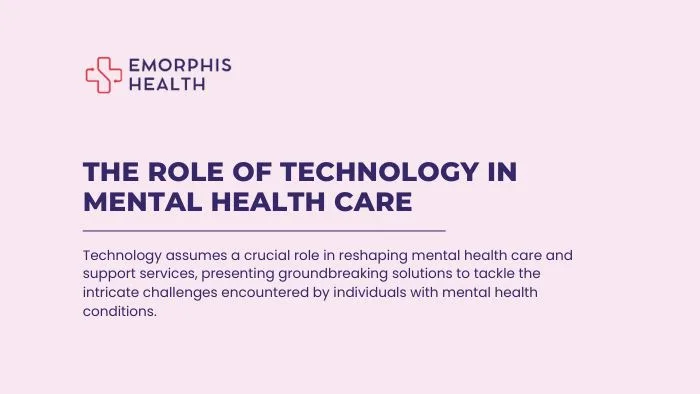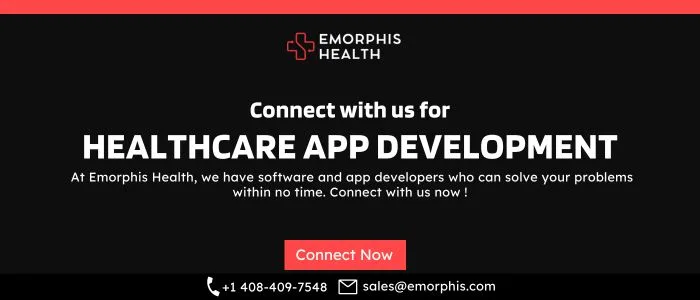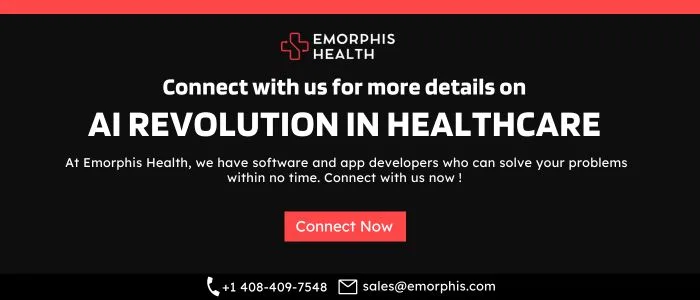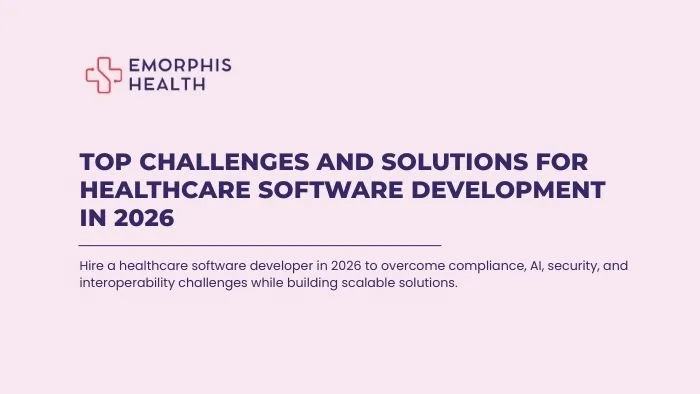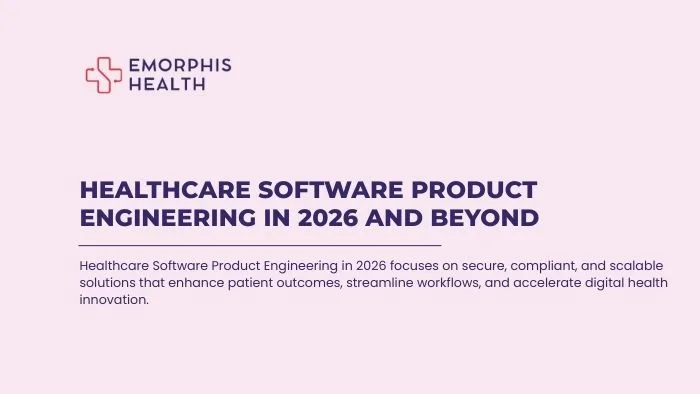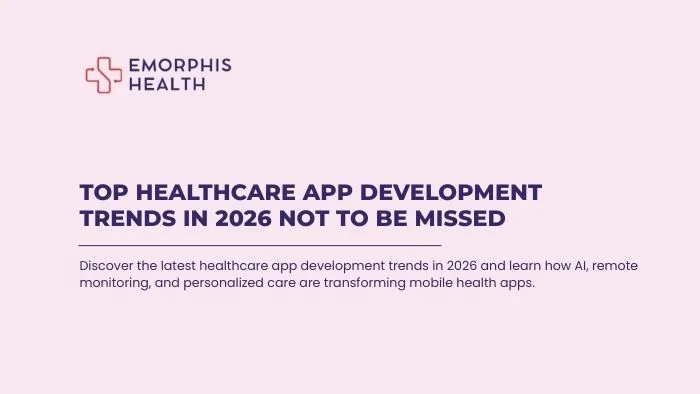How Technology is Helping Mental Health Care
See Contents
- 1 How Technology is Helping Mental Health Care
- 2 What will you learn from this article?
- 3 Top Key Areas Addressed by Technology in Mental Health Care
- 4 What are the Apps that can be built to help mental health care patients?
- 5 Popular Apps for Mental Health
- 6 Use and Application of Emerging Technologies and Mental Health
- 7 Use cases of AI in Mental Health
- 8 How can Emorphis Health help build your mental health app?
- 9 Conclusion
Mental health refers to a person’s emotional, psychological, and social well-being. It encompasses how individuals think, feel, and behave, influencing how they handle stress, relate to others, and make choices.
Technology has become an invaluable tool in supporting mental health care by providing various platforms and resources for individuals to manage their well-being. Technology offers numerous ways to address mental health care concerns, including mobile apps for meditation, mindfulness, and mood tracking, online therapy sessions through video conferencing platforms, and wearable devices that monitor physiological indicators of stress and anxiety. These technological innovations provide accessible, convenient, and often cost-effective means for individuals to seek support, learn coping strategies, and track their progress toward better mental health care.
Moreover, technology reduces the stigma associated with seeking help for mental health care issues by offering anonymity and privacy to users, encouraging more people to prioritize their mental well-being.
What will you learn from this article?
From this article, you will learn about the significant role of technologies, such as artificial intelligence, virtual reality, and telehealth platforms, play in revolutionizing mental health care and support. Specifically, you would gain insight into various applications and features of these technologies, including diagnostic support, personalized treatment planning, virtual therapy, and AI-powered chatbots. Additionally, you would understand the potential benefits of leveraging technology in mental health care, such as improved accessibility, enhanced treatment outcomes, and proactive interventions.
Furthermore, the article highlights the importance of addressing ethical considerations, privacy concerns, and inclusivity to ensure the responsible and equitable use of technology in mental health care services. Overall, you would come away with a deeper understanding of how technology is shaping the future of mental health care and how it can positively impact individuals’ lives.
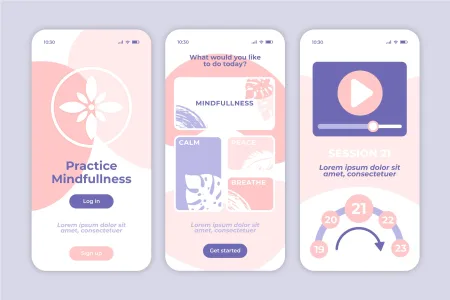

Top Key Areas Addressed by Technology in Mental Health Care
Technology is making significant strides in improving mental health care and support in various ways:
1. Accessibility
Technology provides easy access to mental health care resources, especially for those in remote areas or with limited mobility. Online therapy platforms, mental health apps, and telemedicine services connect individuals with therapists and counselors from anywhere with an internet connection.
2. Education and Awareness
Websites, blogs, social media platforms, and apps disseminate valuable information about mental health care conditions, treatments, and coping strategies. This helps reduce stigma and encourages people to seek help when needed.
3. Self-help tools
Mental health apps offer a wide range of self-help tools, such as meditation guides, mood trackers, breathing exercises, and cognitive-behavioral therapy techniques. These tools empower individuals to manage their mental health care and build resilience.
4. Remote Monitoring
Wearable devices and smartphone apps can track biometric data, such as heart rate variability, sleep patterns, and physical activity levels, which provide insights into mental well-being.
5. Online Support Communities
Social media platforms, forums, and online support groups connect individuals facing similar mental health care challenges. These communities offer a sense of belonging, validation, and support, reducing feelings of isolation and loneliness.
6. Virtual Reality Therapy
Virtual reality (VR) technology is being used to treat various mental health care conditions, such as phobias, PTSD, and anxiety disorders. VR exposure therapy allows individuals to confront and manage their fears in a controlled and immersive environment.
7. Artificial Intelligence (AI)
AI-powered chatbots and virtual assistants provide personalized mental health care support and interventions. These bots can offer immediate assistance, 24/7, and help users identify patterns in their thoughts and behaviors.
8. Data Analytics
Big data analytics and machine learning algorithms analyze large datasets to identify trends, predict mental health care outcomes, and improve treatment effectiveness. This data-driven approach enhances personalized care and decision-making in mental health care services.
While technology offers numerous benefits for mental health care, it’s essential to address challenges such as privacy concerns, data security, the digital divide, and the need for human connection in therapy and support services. Integrating technology with traditional mental health care practices can maximize its potential and ensure holistic care for individuals.
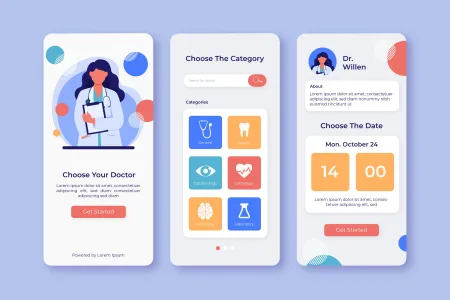

What are the Apps that can be built to help mental health care patients?
Various types of apps can be developed to help mental health care patients. Here are some examples:
a. Mood Tracking Apps
These apps allow users to track their mood fluctuations, triggers, and symptoms over time. They can provide valuable insights for both users and their healthcare providers to identify patterns and trends, facilitating personalized treatment plans.
b. Mindfulness and Meditation Apps
These apps offer guided meditation sessions, breathing exercises, and mindfulness practices to reduce stress, and anxiety, and improve overall well-being. They often include features like progress tracking, reminders, and personalized recommendations.
c. Cognitive Behavioral Therapy (CBT) Apps
CBT apps provide self-help tools and exercises based on cognitive-behavioral therapy principles to challenge negative thought patterns, manage emotions, and improve coping skills. They may include interactive activities, journaling prompts, and goal-setting features.
d. Peer Support Networks
These apps connect individuals facing similar mental health challenges, allowing them to share experiences, offer support, and build community. Features may include anonymous forums, chat rooms, and resource sharing.
f. Teletherapy Platforms
Teletherapy apps enable users to access licensed therapists and counselors through video, voice, or text-based sessions. They often include scheduling, payment processing, and secure messaging features to facilitate remote therapy sessions.
g. Sleep Improvement Apps
These apps focus on improving sleep quality and addressing insomnia, a common issue among individuals with mental health care conditions. They may offer sleep tracking, relaxation techniques, and personalized sleep hygiene tips.
h. Symptom Management Apps
Apps are designed to help manage specific mental health conditions, such as depression, anxiety, bipolar disorder, or PTSD. They may include medication reminders, symptom tracking, and educational resources tailored to each condition.
i. Digital Journaling Apps
Journaling apps provide a platform for users to express their thoughts, feelings, and experiences in a private and secure environment. Writing regularly can help individuals process emotions, gain insights, and track progress in their mental health care journey.
When developing mental health apps, it’s crucial to prioritize user privacy, security, and accessibility. Collaborating with mental health professionals, incorporating evidence-based practices, and conducting usability testing can ensure that the app effectively meets the needs of its target users. Additionally, seeking input from mental health patients throughout the development process can help create a more user-centered and impactful solution.
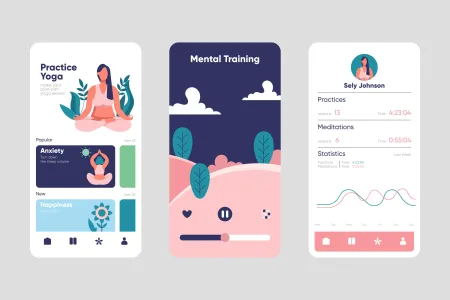

Popular Apps for Mental Health
Some of the popular mental health apps include:
- Headspace – Headspace is a meditation and mindfulness app that offers guided meditation sessions, sleep sounds, and mindfulness exercises. It has millions of downloads and a large user base globally. Specific stats may vary over time, but as of my last update, it had over 65 million users worldwide.
- Calm – Calm is another popular meditation and sleep app that provides guided meditation sessions, sleep stories, breathing exercises, and relaxation music. It has been downloaded millions of times and is highly rated on app stores. It has over 100 million downloads globally.
- Talkspace – Talkspace is an online therapy platform that connects users with licensed therapists through text, voice, and video messaging. It offers various subscription plans and has gained popularity for its convenience and accessibility. Specific user statistics may vary, but it has served over 1 million users.
- BetterHelp – BetterHelp is another online therapy platform that provides counseling and therapy services through video, voice, and text-based communication. It offers a wide range of licensed therapists and flexible subscription plans. As of my last update, it has served over 2 million users.
- Moodpath – Moodpath is a mood-tracking and mental health care screening app that helps users assess their emotional well-being and track symptoms of depression. It provides personalized insights and resources based on user responses. Specific user statistics may vary, but it has been downloaded over 1 million times.
- 7 Cups – 7 Cups is a peer support platform that connects users with trained listeners for emotional support and active listening. It offers chat-based support, group discussions, and self-help resources. As of my last update, it has served millions of users worldwide.
Use and Application of Emerging Technologies and Mental Health
Emerging technologies are playing a crucial role in revolutionizing mental health care and support. Here are some key uses and applications of emerging technologies in mental health care:
A. Virtual Reality (VR) Therapy
VR technology is being increasingly used for exposure therapy, particularly in treating phobias, PTSD, and anxiety disorders. By immersing individuals in virtual environments that simulate real-life situations, VR therapy allows them to confront and manage their fears in a controlled and safe environment.
B. Augmented Reality (AR) for Education and Training
AR technology can enhance mental health education and training for both professionals and patients. It can be used to create interactive simulations, visualizations, and educational materials that help individuals understand mental health care conditions, treatments, and coping strategies better.
C. Artificial Intelligence (AI) for Diagnosis and Treatment
AI-powered tools and algorithms can analyze large datasets of patient information, including symptoms, genetic data, and treatment outcomes, to assist in diagnosing mental health care conditions and personalizing treatment plans. AI chatbots and virtual assistants can also provide immediate support and interventions for individuals experiencing mental health crises.
D. Mobile Apps and Wearable Devices
Mobile apps and wearable devices equipped with sensors can track various biometric data, such as heart rate variability, sleep patterns, physical activity levels, and stress levels. This data can provide valuable insights into an individual’s mental well-being, allowing for early detection of symptoms and personalized interventions.
E. Telehealth and Telemedicine
Telehealth and telemedicine platforms leverage technology to provide remote mental health services, including therapy sessions, consultations, and medication management. This allows individuals to access mental health care from the comfort of their homes, overcoming barriers such as geographical distance and mobility issues.
F. Biofeedback and Neurofeedback
Biofeedback and neurofeedback technologies enable individuals to monitor and regulate physiological processes, such as heart rate, breathing, and brainwave activity, in real-time. By learning to control these processes through feedback mechanisms, individuals can improve their emotional regulation, stress management, and overall mental well-being.
G. Blockchain for Data Security and Privacy
Blockchain technology offers enhanced security and privacy for mental health data by decentralizing storage and ensuring data integrity and confidentiality. It can be used to securely store electronic health records, facilitate data sharing between healthcare providers, and empower individuals to have more control over their health information.
H. Predictive Analytics and Machine Learning
Predictive analytics and machine learning algorithms analyze large datasets to identify patterns, predict mental health outcomes, and inform preventive interventions. These technologies can help healthcare providers identify individuals at risk of developing mental health conditions or experiencing relapses and tailor interventions accordingly.
By leveraging these emerging technologies, mental health professionals can enhance the quality, accessibility, and effectiveness of mental health care and support, ultimately improving outcomes for individuals with mental health conditions. However, it’s essential to address challenges such as data privacy, ethical considerations, and disparities in access to technology to ensure equitable and ethical implementation.
Use cases of AI in Mental Health
AI has numerous use cases and features in mental health, enhancing both diagnosis and treatment. Here are some examples:
1. Diagnostic Support
AI algorithms can analyze vast amounts of patient data, including medical records, genetic information, and behavioral patterns, to assist clinicians in diagnosing mental health conditions accurately. By identifying subtle patterns and correlations that may not be immediately apparent to human clinicians, AI can improve diagnostic accuracy and reduce misdiagnosis rates.
2. Personalized Treatment Planning
AI algorithms can analyze individual patient data to identify the most effective treatment options based on factors such as symptom severity, comorbidities, genetic predispositions, and treatment response history. This personalized approach ensures that patients receive treatments tailored to their specific needs, improving outcomes and reducing the likelihood of adverse effects.
3. Chatbots and Virtual Assistants
AI-powered chatbots and virtual assistants can provide immediate support and interventions for individuals experiencing mental health crises or seeking information about mental health conditions, treatments, and coping strategies. These virtual agents can offer empathetic listening, psychoeducation, crisis intervention techniques, and referrals to appropriate resources or healthcare providers.
4. Natural Language Processing (NLP)
NLP algorithms can analyze text-based data, such as electronic health records, patient questionnaires, therapy transcripts, and social media posts, to extract valuable insights about patients’ mental health status, treatment progress, and social support networks. NLP can also be used to monitor changes in language use and sentiment over time, which may indicate shifts in mental health symptoms or treatment response.
5. Emotion Recognition
AI algorithms can analyze facial expressions, vocal intonations, and other physiological signals to infer individuals’ emotional states and detect subtle changes that may indicate underlying mental health issues, such as depression, anxiety, or stress. Emotion recognition technology can be integrated into wearable devices, telehealth platforms, and virtual reality environments to provide real-time feedback and interventions.
6. Predictive Analytics
AI algorithms can analyze longitudinal patient data to identify predictive markers and risk factors for mental health conditions, relapse, or treatment non-response. By detecting early warning signs and high-risk individuals, predictive analytics can enable proactive interventions, such as early detection screenings, preventive therapies, or targeted interventions to mitigate risk factors.
7. Virtual Reality Therapy
AI-powered virtual reality environments can simulate real-life situations and scenarios to facilitate exposure therapy for individuals with phobias, PTSD, and anxiety disorders. AI algorithms can adapt the virtual environment in real time based on patients’ responses and physiological signals, optimizing the therapeutic experience and promoting desensitization and habituation.
8. Digital Phenotyping
AI algorithms can analyze passive data collected from smartphones, wearable devices, and other digital technologies to assess individuals’ behavioral patterns, social interactions, sleep habits, and other relevant factors that may impact mental health. Digital phenotyping techniques can provide objective, real-time measures of patients’ daily functioning and help clinicians monitor treatment adherence and progress remotely.
These are just a few examples of how AI can be used in mental health to improve diagnosis, treatment, and support services. By leveraging AI technologies, mental health professionals can enhance the precision, accessibility, and effectiveness of care, ultimately improving outcomes for individuals with mental health conditions.
How can Emorphis Health help build your mental health app?
Emorphis Health is well-positioned to assist in building your mental health app, leveraging its expertise in software development and healthcare technology. Here’s how Emorphis Health can help:
- Customized Solutions – Emorphis Health can collaborate with you to understand your specific requirements and design a tailored mental health app that meets the unique needs of your target audience. Whether you’re looking to develop a mood-tracking app, virtual therapy platform, or AI-powered chatbot, Emorphis Health can provide customized solutions to bring your vision to life.
- Expertise in Healthcare Technology – With experience in developing healthcare software solutions, Emorphis Health understands the complexities and regulatory requirements of the healthcare industry. They can ensure that your mental health app complies with relevant regulations, such as HIPAA, and meets industry standards for security, privacy, and interoperability.
- Integration Capabilities – Emorphis Health can integrate your mental health app with existing healthcare systems, electronic health records (EHRs), and telehealth platforms to facilitate seamless data exchange and interoperability. This integration ensures that healthcare providers have access to comprehensive patient information and can coordinate care effectively.
- User-Centered Design – Emorphis Health prioritizes user-centered design principles to create intuitive and user-friendly interfaces for your mental health app. By conducting user research, usability testing, and iterative design processes, they can ensure that the app is easy to navigate and engaging for both patients and healthcare providers.
- Advanced Technologies – Emorphis Health has expertise in implementing advanced technologies, such as artificial intelligence, machine learning, and augmented reality, to enhance the functionality and effectiveness of your mental health app. Whether it’s developing AI algorithms for diagnostic support or incorporating VR therapy simulations, they can leverage cutting-edge technologies to deliver innovative solutions.
- Ongoing Support and Maintenance – Emorphis Health provides ongoing support and maintenance services to ensure the reliability, performance, and security of your mental health app post-launch. They can monitor app performance, address any technical issues or bugs, and implement updates or enhancements as needed to keep the app up-to-date and responsive to user needs.
Overall, partnering with Emorphis Health can help you build a high-quality, feature-rich mental health app that delivers value to both patients and healthcare providers. Their expertise in healthcare technology, customized solutions, and commitment to user-centered design ensures that your app meets the highest standards of quality, compliance, and usability.
Click the link to check our Healthcare Portfolio.
Conclusion
In conclusion, technology plays a pivotal role in transforming mental health care and support services, offering innovative solutions to address the complex challenges faced by individuals with mental health conditions. From teletherapy platforms and mobile apps to artificial intelligence and virtual reality, emerging technologies offer a wide range of tools and interventions to improve diagnosis, treatment, and support. These technologies enhance accessibility, personalize care, and empower individuals to manage their mental well-being effectively.
However, it’s essential to prioritize ethical considerations, privacy protections, and inclusivity in the development and implementation of these technologies to ensure equitable access and ethical use. By harnessing the potential of technology and integrating it with traditional mental health practices, we can create a more comprehensive and holistic approach to mental health care, ultimately improving outcomes and quality of life for individuals across the globe.

